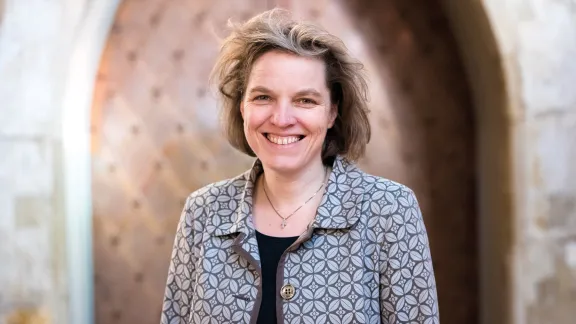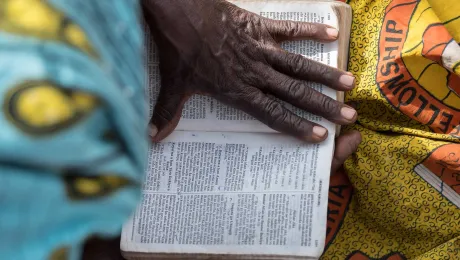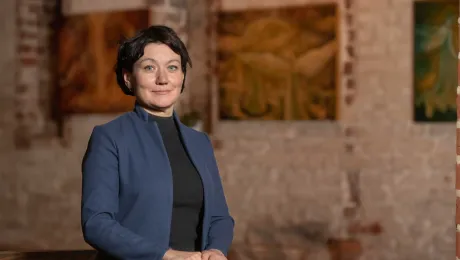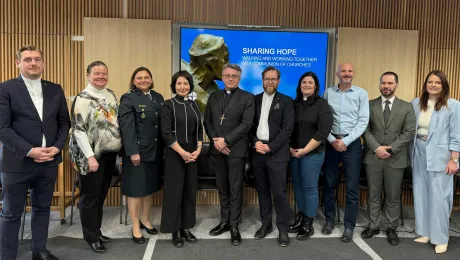In this Voices from the Communion interview, Pröpstin Astrid Kleist speaks about her leadership at the local and international levels and the characteristics of the Central Western European region. She looks back at her term of office with the LWF and forward to the upcoming Thirteenth Assembly in Krakow, Poland.

Pröpstin Astrid Kleist, LWF Vice-President for Central Western Europe. Photo: G2 Baraniak
Voices from the Communion: Pröpstin Astrid Kleist, LWF Vice-President for Central Western Europe
(LWI) – Born and bred in the city of Hamburg in Northern Germany, Astrid Kleist has been an ordained pastor of the Evangelical Lutheran Church in Northern Germany and a church leader for many years.
She was elected Vice-President for Central and Western Europe during the Twelfth Assembly of the Lutheran World Federation (LWF) in Windhoek, Namibia, in 2017.
In this interview, she speaks about her leadership at the local and international levels. She looks back at her term of office with the LWF and forward to the upcoming Thirteenth Assembly in Krakow, Poland.
Please tell us about your career as a pastor and Pröpstin (provost) in Hamburg.
From 2003 to 2013, I was a dedicated pastor in a Hamburg congregation. I worked closely with and accompanied people of all generations. After that, I became the leading pastor in St. Jacobi, one of the prominent Lutheran city churches in Hamburg with a long tradition and have been Pröpstin (provost) for the past ten years. I am currently responsible for 15 congregations and 30 pastors, and in a team with six other provosts, I lead a large church district. It includes a total of 109 parishes with around 371,700 members.
What have been the most important issues during your term of office as Vice-President of the Central Western Europe region and an LWF Council member?
First, the Twelfth LWF Assembly in Windhoek itself remains an unforgettable experience. But, above all, the COVID-19 pandemic has marked a dramatic turning point for the work of the Council and the Executive Committee. And it has challenged the communion as a whole: to express compassion for those who have been particularly affected by the consequences of the pandemic, trying to come to each other’s help.
Actively facing the challenge together, not remaining in a state of shock or isolation, but making use of all remaining possibilities; also trying out and learning at lightning speed about new developments in communication and maintaining contact through the increased use of digital media. I am fascinated by what we have also gained and learned in the process and the face of adversity. For example, the tremendous response that LWF webinars receive worldwide excites me. The potential of e-learning and the possibilities of digital meeting formats is impressive. Of course, that cannot replace in-person meetings, but it can complement them.
This term was also marked by Martin Junge stepping down as General Secretary and the search for a successor. Then it was a great joy to elect Anne Burghardt as the first woman and leader of the Central Eastern European region to this office.
Please describe the characteristics and challenges that shape the LWF member churches in Central Western Europe.
The region is strongly characterized by most of its member churches being from Germany, with all the tradition and self-confidence this implies. In addition, they are supported by the LWF German National Committee.
The other member churches of the region are in Austria, France, Liechtenstein, Netherlands, Switzerland, and the United Kingdom. They are smaller but energetic and clever, and they manage their sometimes limited human and financial resources well.
However, due to their size and limited capacities, it is often a principal decision whether they want to and can become involved in the numerous international ecumenical church fellowships and confessional alliances such as the LWF.
At the same time, I have the impression that they sometimes perceive more clearly and intensively than the larger churches the gift of having partner churches in Europe and worldwide, broadening horizons and strengthening one another’s self-confidence and common witness.
“Local to global to local” is an essential principle of LWF’s work. How does this interaction shape your ministry at the local and international levels in Hamburg and worldwide?
The interaction and interdependence between local and global have become a lot clearer to me through my engagement in the LWF. Take, for example, the current sustainability and climate protection issues: clearly, no church can decide for itself alone. Whatever and however we decide, this also has consequences for the sister churches. That also applies, among others, to how we organize our collaboration in the LWF communion and what we advocate for or leave aside.
One Body, One Spirit, One Hope: What do you associate with the theme of the LWF Thirteenth Assembly, and what does it mean for the Central and Western European region?
The German word “hoffen” (hope) comes from “hopen”, which means to hop, skip, or jump. I hope the Assembly will give impulses to make hope leap within us. That we will feel in our bodies the hope to which we are called as communion and make sure that the Spirit of Christ drives us to stop the evil spirits in the world. That it is the spirit of strength, love and wisdom that guides us, not the spirit of fear.
Delegates from the three European regions of the LWF (Central Western Europe, Central Eastern Europe, and the Nordic countries) will soon meet for the first Pre-Assembly. What do you hope to achieve from this conference?
I hope that the excitement for the Thirteenth Assembly in Krakow will rise. That we will begin getting to know each other and prepare for the topics and content related to that gathering. I hope we will listen to one another carefully and are curious about what we have to say to each other, asking how God’s voice can be discerned in the process.


